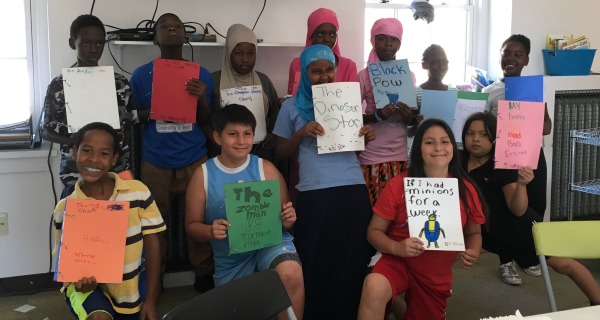
M knows how to write his birthdate, and that’s about it. September 25, 2007. In numbers, not letters. He writes a beautiful 9, perfect round zeroes. He’s from Somalia, and he is still learning English. On Monday nights, I teach writing at the housing project where he lives. Everything he tells me, he tells me with his eyes. They’re big and brown.
I only know what makes him happy by how they light up. LeBron James does it, soccer does it, and, always, “take four Starbursts.” But they stay flat on Steph Curry, football, and M&Ms.
M’s eyes remind me of my dad’s. He came to this country at the same age as M. Nine.
…
When my dad came to America, he wore a suit coat. He was freshly orphaned and before he left Iran, one of his uncles tried to cheer him up by giving him a new fountain pen. He put it in his inside coat pocket. When the plane landed in New York, the cartridge had leaked to empty. It had stained the inside of the child-sized jacket blue for good. The jacket hung in my closet my whole childhood, just a place to store it, I figured. Every morning I’d wake up, get dressed, see the ink stain. It was just wallpaper, something that was always there.
…
M practices writing “soccer” in the margins of his notebook. I write it for him at the top of the page and then he copies it. Then he covers up my “soccer” and his “soccer” and tries to write it from his memory. Over and over, a list of crossed out “soccer”s running all down the page.
…
On Thanksgiving this year, I told my dad about M and asked him for tips. He didn’t want to talk about it, he told me with his eyes. But I pushed him. “I just wonder if you remember how you learned English so fast?”
“The beatings helped,” he said.
…
Last week, I overheard a boy who goes to the same school as M say that on the soccer field at school, the other boys punch him.
The staff support person in the classroom asked, “What does M do when he’s punched?”
“He does nothing. He doesn’t believe in violence. He wouldn’t hurt anyone,” the boy said.
…
Once, rifling through my mom’s dresser drawer, I found love poems my dad had written her before they got married. My mom is American; the poems were written in English.
When I graduated from college, my dad picked me up so we could make the three-day drive back home to Kansas. For me, it was a defeat. I’d gone to college to become a writer and I still wasn’t one; I was going home with my tail between my legs. On the last morning of our drive, my dad said, matter-of-fact, “Why don’t you set up a desk in my office and come in with me every day and write like it’s your job.”
…
One day in class, M was tipping back in his chair and fell out of it. I braced myself. There is simply nothing funnier to a classroom of children. The raucous laughter came on cue and I was about to tamp it down when I saw happiness in M’s eyes. He’d made them laugh. In a manner of speaking, he said something and they heard him.
…
Ancient spilled ink. Love poems. All along my dad was saying something, and I heard him.
…
Here is something that maybe seems like nothing to you: in class this week, M wrote a sentence in his notebook, which was, “My heroes are soccer players.”
…
On my drive home on Monday nights, I think about M. How I can’t talk to him and he can’t talk to me. The sky grows darker, and I just get sadder.
But maybe we are talking. To a boy in the past who must have been so scared but made himself be brave. To a future M that I will only get to imagine. An M who maybe has a daughter. One day, he’s driving her home from school and from the backseat she says, “I think I want to be a writer.”
And M knows what to say.
Editor's Note: You can support programs like these by making a Colorado Gives Day donation! Click here.
Alison Preston is a writer and writing teacher. She has a BFA in writing & literature from Emerson College and an MA in secondary English education from the University of Missouri-Kansas City. She's working on a collection of stories. She teaches for Lighthouse's Young Writers Program.

